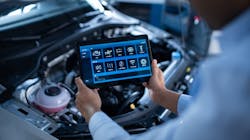What is the Importance of Financing Equipment for OEM Certification?
For many shops, OEM certification is the one thing standing between them and their competition. Although OEM certification increases sales in the long run, the initial investment can seem daunting. FenderBender sat down with Paul Knowlton from Huntington Bank to talk about financing equipment for OEM certification and how it can benefit your business.
FenderBender: How does financing OEM equipment benefit a business?
Paul Knowlton: The main benefit to small businesses is that they can preserve liquidity and working capital for other purposes. Once you pay cash for equipment, you've essentially locked up that liquidity, which is now stored in the equipment and unavailable for other working capital needs. Financing your OEM certification equipment is a great way to maximize the tax benefit while minimizing the effect on working capital. It's 100% financing, so the installation, delivery and all costs are included in the financing amount. This also allows the equipment to pay for itself. Most of the equipment required through OEM certification is revenue-generating equipment. By financing it, you're matching cashflow, and the revenue generated will be more than the equipment lease payments. So again, you're allowing the equipment to pay for itself by financing it, while maximizing the tax advantages of equipment purchases.
FB: How does OEM certification help a shop expand and increase sales?
PK: The strongest, most successful shops are those that are looking forward and getting their OEM certifications. It's not inexpensive, but these are forward-looking shops that review their demographics and business makeup to decide the best strategy for the future. The decision to obtain OEM certification is to deepen relationships and attract new businesses. For example, a shop may already be working on BMW, but with OEM certification, BMW dealerships will likely send more business its way. The goal of the OEM certification is to identify which segment of business you want to grow. Typically, if you work on certain manufacturers, you must have that certification.
FB: What is the first step towards financing equipment?
PK: Reach out to a couple sources. Get quotes from Huntington and other finance companies. Ask them what kind of financing options they can provide. Try to compare apples and apples. Also, asking the equipment vendor for some financing options is a good idea as well.
FB: What should a business look for when choosing where to finance their equipment?
PK: I typically like to see some industry knowledge or expertise from your lessor. The company that finances your copiers, or even your vehicles, isn't necessarily the right company to finance the OEM equipment. Our team at Huntington has been in this space for a number of years. We speak the industry language. We understand there are different components and nuances to this type of financing. And we know every shop has unique needs.
FB: What red flags should businesses look out for when choosing where to finance equipment?
PK: Shops are on a high “hit list” of telemarketers in my industry. Body shops are constantly being called by people who are offering them money to finance equipment, but generally, if you haven't heard of them, there's a reason. There's a lot of small non-direct lenders. Make sure you're dealing with a direct lender rather than a broker. We're lending our own money, and that allows us to provide more competitive pricing and stability
FB: Why Huntington is a good option for financing equipment?
PK: Huntington's Equipment Finance Group, which serves customers across the country, will help you decide the best option leveraging our deep experience and expertise. When you're in the market for new equipment, you need to look at all your options. It simply may not make sense to purchase equipment with large amounts of cash that can be used for other opportunities.
Contact Paul Knowlton for more information regarding equipment financing.
(415)-933-9693
